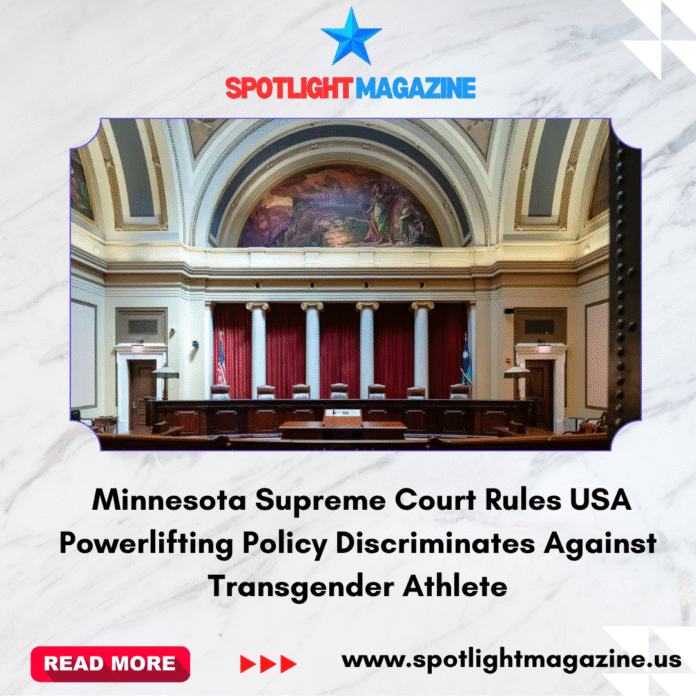The Minnesota Supreme Court has ruled partly in favor of transgender powerlifter JayCee Cooper in her discrimination case against USA Powerlifting. Cooper sued the organization after it refused to let her compete in the women’s division, claiming the decision violated the Minnesota Human Rights Act (MHRA). The law prohibits discrimination based on gender identity, even though the specific term “gender identity” wasn’t explicitly included until a 2023 amendment. At the time Cooper filed her complaint in 2021, the MHRA’s definition of sexual orientation already covered people whose gender identity did not match their biological sex, so her case qualified under that rule.
This is a state-level case since federal law does not yet ban discrimination in public accommodations based on gender identity or sexual orientation. Cooper first won in the trial court, which ruled that USA Powerlifting had discriminated against her. However, the Court of Appeals later reversed that decision, saying there were factual questions that needed to be decided at trial.
In its latest decision, the Minnesota Supreme Court agreed with both sides to some degree. The justices said USA Powerlifting’s blanket ban on transgender women competing in women’s events was clearly discriminatory under the MHRA’s “public accommodations” section. When Cooper applied to compete, she was told directly that transgender women were not allowed in the women’s category, which the court said was direct evidence of discrimination. Chief Justice Natalie Hudson wrote that this kind of exclusion cannot be justified under the law’s public accommodations protections.
However, the court also found that the organization might have a potential defense under a separate part of the MHRA dealing with business practices. That section allows for a “legitimate business purpose” defense, meaning USA Powerlifting could argue that excluding transgender women was necessary for reasons such as fairness in competition. The court said there are factual disputes over whether that claim is valid—specifically, whether allowing transgender women who went through male puberty would create unfair advantages. Because of this, that part of the case will go back to the trial court for further examination.
Cooper, who was assigned male at birth and began her transition as an adult, has been taking medication to reduce testosterone levels. USA Powerlifting argued that because she experienced male puberty, she would retain a physical strength advantage that could make competition unfair. Cooper’s lawyers countered that her participation would not harm the integrity of women’s powerlifting.
The Supreme Court ultimately ruled that USA Powerlifting’s overall policy is discriminatory, but left room for the lower court to decide whether its specific refusal to let Cooper compete could be justified under the “legitimate business” clause. In short, Cooper won on the question of discrimination in public accommodations, but the final outcome will depend on the trial court’s decision about whether the organization’s actions were lawful from a business perspective.
The court’s opinion was unanimous, with no dissenting justices. The ruling cannot be appealed to the U.S. Supreme Court. Cooper is represented by Gender Justice and other local attorneys, with support from the Minnesota Attorney General’s Office and several advocacy groups, including the ACLU of Minnesota. The decision marks a significant step in the ongoing national conversation about transgender athletes and fairness in competitive sports.


